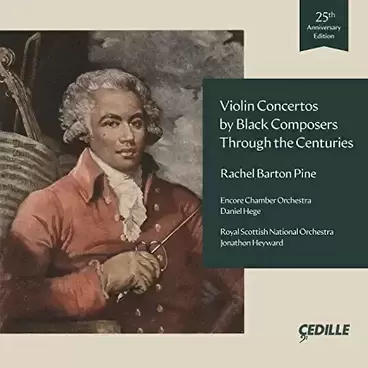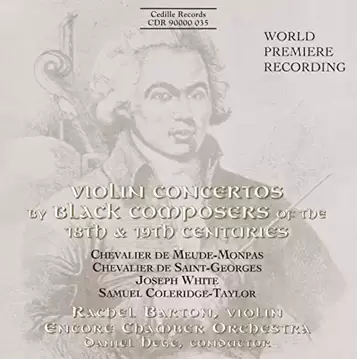Rachel Barton Pine's "Concertos by Black Composers" album reissued with a new track added.9/18/2022 What an intriguing release from Cedille Records. Paying attention to the marketing of it, though, it is important to note this is a reissue of Rachel Barton Pine's earlier, similarly titled 1997 CD release: "Violin Concertos by Black Composers of the 18th & 19th Centuries", but with one concerto excised (the Chevalier de Meude-Monpas) and a brand new recording appended in its place. And with that one new addition (the marvelous Concerto #2 by Florence Price), this album acquires new relevance and musical satisfaction. For that work alone is quite wonderful.
Would that I could say the same about the rest of the program. Though if I found the three works from the original release less musically gratifying, they are nonetheless important and worthy of a listen, certainly deserving a place on the collector's shelf. Joseph Bologne's A-Major Concerto of 1775 is interesting in that it so unabashedly imitates Mozart. The first two movements remind one of the operatic Mozart (his Overture to Cosi Fan Tutte is recalled so often it's almost comical). The opening Allegro is very long (over 10 minutes) - the orchestral exposition alone goes on for 2-1/2 minutes before the violin finally enters with a delectable melody sounding just like Mozart. Before long, though, the tunefulness is supplemented with some mundane scalic/arpeggiated filler material. I was relieved when the Largo arrives, taking us firmly to the seriousness of a Mozart opera, with a beautiful tune played by our soloist just as an operatic soprano would sing it. This movement too goes on a bit long (nearly 9 minutes), with a lengthy, uninteresting cadenza near its end. The best is yet to come, though. The 3rd movement, Rondeau, with a sudden lightening of mood, transitions into something more charming and musically pleasing - and so accomplished it could pass for a violin concerto by the master himself. It's a pity it lasts only 4-1/2 minutes. Jumping ahead to 1864, we enter into a curious hodgepodge of Max Bruch juxtaposed with Paganini in Joseph White Lafitte's Concerto in F-sharp minor. Traditionally Romantic, serious in the first movement, dramatic in the 3rd, there is more than enough tuneful inspiration to be appealing (at least once through). The opening movement is pretentious, though; that orchestral tutti goes on for a full 3 minutes! When at last the violin enters, it really does sound too much like Bruch - while not quite living up to his illustrious level of accomplishment - for its own good, combined certainly with too much Paganini. There are simply too many notes surrounding the lyrical passages, with lots of double stops, scales and arpeggios sounding more like studio exercises than true musical inspiration. The finale has so much potential, with a truly wonderful melody. But alas, White/Lafitte just can't keep Paganini's finger exercises out of it. The entire piece sounds to be extremely difficult to play and Pine tackles its interminable virtuosity with aplomb while managing to bring as much musical purpose as possible given the uneven source material. Samuel Coleridge-Taylor is a composer I'm more familiar with, and his Romance of 1899 is characteristic of his writing. Tuneful and contemplative, it's ultimately a little too long, clocking in at 12-1/2 minutes. The opening romance section goes on for 6+ minutes before things perk up a little with a wonderful orchestral interlude. Unfortunately, Coleridge-Taylor then settles right back into what has gone on before with the return of the soloist, and the piece is pensive and reflective to the end. It's a heartfelt outpouring of song, confirming Coleridge-Taylor's gift for melody, but I longed for more variety. Interestingly, I hear a bit of Bruch in this piece as well, which is actually more welcome here than in the preceding work. Pine gives it her all, with beautifully singing lines and ardent expression, making the piece quite nice, if ultimately not particularly memorable. Florence Price's wonderful 2nd Concerto, written in 1952, instantly revives the program. Late Romantic and rhapsodic, with a distinctly Americana flavor, it is certainly the most "modern" piece here, securely placed in the 20th-Century. Pine plays it beautifully - not weighing it down with too much richness in her sound. Indeed her sweetly singing violin tone is perfect for its sweeping melodies. She keeps the tunes aglow with fervent graciousness and refrains from taking on too much of a spotlight, welcoming the orchestra as an equal partner in a way not apt for the previous three works. The rich and colorful orchestral contribution here elevates the piece above the others, and conductor Jonathon Heyward provides wonderfully sensitive and thoroughly involving support. As with Coleridge-Taylor's Romance, Price's Concerto is laid out in a single movement, and both are of similar length. But Price offers much more variety and more accomplished orchestral writing. Its many moods draw the listener in, and its final flourish finishes off the program with an exciting ending which would surely bring an audience to its feet in a live performance. I immediately had to listen to it again. Rachel Barton Pine's playing is fabulous all through. The playing of the Encore Chamber Orchestra (members of the Chicago Youth Symphony) in the earlier sessions is very good, if not quite that of a top-tier professional ensemble. In 2022, the Royal Scottish National Orchestra is employed for the Price, but sounds to be of a reduced number of strings, resembling a very good chamber orchestra. As to the production, the recorded sound in 1997 is more than acceptable. It is clear and clean, albeit a bit lean and 2-dimensional compared to the very best. The Price, recorded 25 years later, instantly transports us to a different acoustic - one which is slightly drier and smaller. It's not jolting, but noticeable. Curiously though, even here the sound remains somewhat 2-dimensional, lacking something in spaciousness. I have to admit I was a little disappointed with some of the music contained in this release (as detailed above) and perhaps overly critical. However, despite the importance of the production, I must describe what I hear based upon its musical merits - good, bad and indifferent. Furthermore, I found Cedille's cover art (of this and its predecessor) to be unattractively bland - gray, unimaginative and unenticing. However, there is no denying how invaluable and supremely worthwhile this project is. And I applaud all involved in it. Musically, the Price Concerto is a real find and all by itself is worth the cost of the CD. As is the lavish booklet, which is an absolute tour de force! The Cedille Records production team is to be commended. It contains an abundance of information - over 30 pages about the music, the performers, personal notes from Pine herself, and all the recording details you could ever want. The comprehensive article by Mark Clague about these composers and works is itself a masterpiece in music history and education. (I do not have the original CD, but assume this is newly written for this later release, as it includes much information about Price as well.) Clague is not only Professor of Musicology and Associate Dean at The University of Michigan, but also serves as Chief Advisor to the RBP (Rachel Barton Pine) Foundation's Music by Black Composers Project. His credentials are fully evident in his writing and this is essential reading. The personal notes by Pine herself, written especially for this release, are also enlightening. This is a most worthwhile, informative and important release. Bravo to Rachel Barton Pine and the great folks at Cedille Records for bringing it to production.
1 Comment
Rosemary DuBose
9/24/2022 10:07:49 am
WOW !!!
Reply
Leave a Reply. |
Proudly powered by Weebly


 RSS Feed
RSS Feed